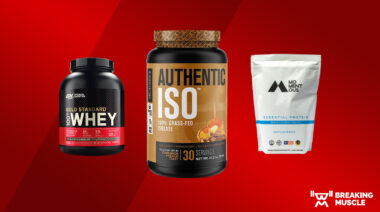Eating to build muscle is a pretty basic practice. You most likely compose your meals of the three main macronutrients: protein, carbohydrates, and fats. You eat at specific intervals throughout the day, and you make sure to eat with regularity and consistency.
But what about those evening cravings when you could easily eat another meal or perhaps you have a sinking feeling that you really should be getting in some nutrition? Sure, you could shovel in another meal of all said macronutrients, but what if you’re on a lean diet and don’t want to scarf down a bunch of carbs before bed? The best answer is that you need a shot of protein with some healthy fats without the fear of carbs doing their damage.
Choking down another chicken breast or serving of fish may not be the most appetizing option for a nighttime feeding. Below are five of the best proteins for muscle gain that aren’t loaded down with carbs so that you can get your protein fix without the bloat.
1. Eggs and Avocado
Arguably the standard in the world of protein, eggs are an excellent choice for late night feeding. As a highly versatile food, eggs can be prepared numerous ways to satisfy your nutritional needs and your palate.
Once thought of as the bane of society, egg yolks are truly a welcome addition, providing you with essential fatty acids that can help regulate hormone levels as well as give you a much-needed dose of satiety.
Avocado is another power food perfect for partnering up with a solid protein pick. Avocado is versatile and it can be added to many dishes. Use it as a substitute for mayonnaise in deviled eggs—season them with a pinch of salt and relish, and you’ll have one lean, mean, late-night protein snack.
Two whole eggs combined with two ounces of avocado yields about 245 calories, 14 grams of protein, six grams of carbs, and 18 grams of fat.
2. Casein and Flax Seed Oil
Although casein protein powder doesn’t have the superstar status that whey has, it could be considered the unsung hero of protein supplementation. As it’s slowly digested, it allows for more of a gradual release of amino acids to give you protein coverage throughout the night. This will keep you in that anabolic state of recovery and repair longer than whey.
Flax seed oil is another healthy fat with a myriad of benefits. Not only will it help slow digestion for your night meal, it will also aid in satiety, decrease inflammation (it can be used to help with rheumatoid arthritis, for example), and help lower cholesterol.
Add a little flaxseed oil to your casein supplement to slow down absorption even more as you sleep so you’ll have a steady stream of protein to help recover from your brutal workouts.
One scoop of casein protein powder (around 28 grams) and one tablespoon of flaxseed oil will give you 220 calories, 20 grams of protein, 3 grams of carbs, and about 4 grams of fat.
3. Greek Yogurt and Chia Seeds
If you haven’t heard of the benefits of Greek yogurt by now then you must be a newbie to the fitness lifestyle. It is loaded with live and active cultures to aid in gut health (namely motility and healthy digestion), and it also has more protein on average than regular yogurt. So you get more bang for your caloric buck. It makes a great addition wherever you place it in your meal plan.
Chia seeds have made their way into the American mainstream diet with ease and for good reason. They’re high in fiber, packed with antioxidants, contain key omega-3 fatty acids, and are high in quality protein. Furthermore, they’re easy to add to virtually any meal. Just sprinkle a little on a variety of your favorite foods or simply top off your Greek yogurt with a tablespoon or two and you’re good to go.
One cup of Greek yogurt and one tablespoon of chia seeds has around 180 calories, 23 grams of protein, 14 grams of carbs, and about 3 grams of fat.
4. Cottage Cheese and Almonds
Greek yogurt shouldn’t take all the dairy protein credit. Cottage cheese still has skin in the game, especially when you want a little variety. This staple includes both casein and whey sources of protein so you get the fast and slow acting benefits of each type. It makes one of the more perfect nighttime sources of amino acids.
Almonds (or any other type of your favorite nut) can induce satiety, give you a shot of healthy fats and help slow the digestive process down to assist in regulating blood-sugar levels. They’re also great for micronutrient uptake as well as they can easily be added to many foods. Simply include them with your cottage cheese or just slam back a handful for a healthy snack.
One cup of lowfat cottage cheese and one ounce of almonds gives you 325 calories, 34 grams of protein, 11 grams of carbs, and about 16 grams of fat.
5. Whey Protein and Peanut Butter
Now we finally get to one of the more popular options as far as protein intake and muscle building is concerned. Numerous companies sell whey products so be sure that you buy from a reputable one that’s been around for some time.
Whey contains a superior amount of essential amino acids, specifically the branched chain kind—leucine, isoleucine, and valine. Quickly digested, it makes an ideal supplement for a post workout recovery shake.
Natural peanut butter is a tasty way to add some natural fat to your diet. Of course you can use any of your favorite nut butter varieties, such as almond, hazelnut, or cashew, just to name a few. Mix some whey protein powder, ice, and natural nut butter in a blender. You may need to adjust ice and/or water to achieve desired thickness.
One scoop of whey protein powder and two tablespoons of natural peanut butter will give you 290 calories, 28 grams of protein, 12 grams of carbs, and 16 grams of fat.
Get in the Protein
Meeting your protein needs isn’t as boring as you think. You just need to choose some specific, high-protein sources and get just a little creative in how you combine them. Soon you’ll be sleeping better knowing your protein needs are met.






